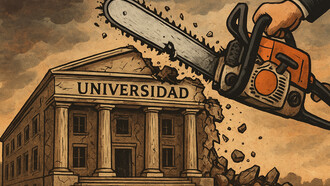There is an inseparable connection between the pursuit of an ecological future and the pursuit of justice. We can have both or we will have neither. This needs to be our guide for the economic and ecological transformation to come.
Economic growth in a democratic global market system must mean ecological improvement guided by the pursuit of sustainability and social and ecological justice. A global convergence on long-term ecological sustainability and shared prosperity and justice cannot succeed in a global system dominated by the self-interest of a handful of billionaires and ever deepening divisions between the rich and the poor. Globally, humanity and the ecosphere will rise or sink together. Our common futures, the health and well being of our civilization and biosphere, will depend on how we respond to the ecological challenge.
We must consider the concept and practice of global ecological economic growth (EEG). It recognizes that the fundamental issue of our times is the ecological and social consequences of economic activity. We can build global economy orders of magnitude larger in economic terms and, at the same time, with orders of magnitudes less pollution, depletion and ecological damage. An ecological civilization means a new way of wealth creation and a new chapter in sustainable global economic growth. This means building a world based on ecological wealth and the regeneration and health of the ecosphere and monetizing and sharing ecological value. In practice, it means economic growth becoming ecological improvement.
The paradigmatic example, among many, is the global replacement of all fossil fuels and nuclear fission power by renewable energy and natural carbon sequestration which, if done well, will lead to an enormous improvement in global ecology including the return of the atmosphere to pre-industrial carbon levels and enormous amounts of sustainable wealth creation.
We can value and monetize the trillions of dollars of ecological wealth created by carbon dioxide displacement by renewables and sequestration of carbon by sustainable agriculture, aquaculture, forestry, and a zero pollution zero waste industrial ecology. Markets guided by new ecological market rules and using tools like Sustainability Credits (SCs) from carbon displacement or sequestration can be the instrument for sustainability and the investment of many $ trillions in global ecological transformation.
A global market system can become the instrument for our collective deliverance and co-evolution with a once again thriving ecosphere. Humanity must become an effective and self-conscious participant in global sustainability where life responds to all influences on the ecosphere. As the ecosphere changes, life changes and responds to help create conditions beneficial for all life.
We are already world changers. We are unleashing mass extinction, habitat degradation, climate change. It is in our power and a fundamental necessity to change. We can transform our global market system to one which does both good and well on the basis of market rules and ecological redefinition of fiduciary responsibility to make economic growth and the pursuit of profit mean ecological improvement within the context of social and ecological justice.
The challenge of industrial business and pollution as usual
The core of our underlying global problems leading us toward self-destruction is global industrialism. Economic activity still means profound ecological damage through pollution, depletion, habitat destruction manifest in the accelerating global mass extinction of the Anthropocene. This is extraordinary.
A cataclysmic event with global geophysical consequences for the ecosphere is the result of self-conscious action by humanity. In the past, periodic mass extinction was unleashed by forces like mass volcanism pouring gigatons of carbon dioxide into the atmosphere, or the result of a huge meteor strike that ended the age of dinosaurs and globally led to the extinction of about 75% of all species.
The truth, the bottom line, is that current human conduct is unsustainable. The consequence of continued industrial business as usual is ecological collapse and the acceleration of the great dying now underway that will soon be shared by humanity and not just by others, the insects, amphibians now vanishing globally at alarming rates.
Our futures must be transformed by deliberate and prompt human action to eliminate fossil fuel pollution, to pursue a zero pollution, zero waste industrial ecology, to practice ecological agriculture, forestry, aquaculture. The alternative to self-destruction is to build a just and sustainable ecological civilization.
An ecological turn
The available tools for building successful global markets that make economic growth mean ecological improvement that are considered in this article are new ecological market rules that:
- sends clear price signals for sustainability through ecological taxation replacing some or all income taxes. Sustainable goods and services become cheaper, gain market share, and become more profitable. Sustainable business becomes synonymous with profitable business and ecological improvement;
- establishes a new definition of fiduciary responsibility by law and regulation that economic growth means ecological improvement and the pursuit of ecological sustainability in the context of social and ecological justice;
- monetizes ecological property and sustainability through a new regulatory asset called Sustainability Credits (SCs) based on the ecological value of carbon displacement and sequestration by renewables determined by the National Academy of Sciences (N.A.S.) to be monetized on the books of investment banks and by the Bank of the Commons (BOC) that can produce trillions of dollars to invest in the ecological transformation and a Basic Income for all.
Our tasks are more than just building solar panels and wind machines. We must understand that the practice of self-destructive action, pollution, depletion, habitat destruction rests upon injustice, inequality, and enormous disparities of power between the few and the many. The world led by a billionaire class operating in pursuit of its interests is incompatible with both the effective practices of democracy and an ecological turn. While some, even most, billionaires may harbor, and even practice, ecological sentiments, the existing market rules under which they have created and expand their wealth and power are largely based upon the practice of ecological pillage and inequality as usual.
Wildfire, floods, droughts, superstorms, winter tornadoes, crop failures make it clear that the clock is clicking louder and louder. The necessity to deal with the consequences of climate change before geophysical forces foreclose options is becoming clearer by the minute. The debate is switching to what must be done, how to do it, how to pay for it.
Net-zero is not enough. Planetary health and wealth must lead to an ecological restoration that also means the creation of trillions of dollars in sustainable ecological wealth monetized on balance sheets as paid-in-capital and as cash. Ecological balance sheets reflecting real wealth, the new gold, is a key turning point to restore reality and ecological sanity to business and the pursuit of profit. The key point here is the creation of SCs by carbon displacement by renewables, and sequestering carbon in soil and biomass at land and sea is based on the ecological value of carbon displacement calculated as equal to $100 a metric ton of carbon dioxide. This represents a real increase in wealth and should be accounted for as such. Valuing ecological sustainability as it spreads throughout the economy and combined with ecological taxes on pollution will create enormous and irresistible market pressure for the pursuit of profit to mean the pursuit of ecological improvement.
Valuing ecological sustainability is the logical next step after valuing information, making ecological sustainability the new profit center. The richest and most powerful corporations are now largely based on the value of their information, manifest in their computer programs and algorithms that stand behind Google, Facebook, Amazon, Baidu, Tencent, Alibaba. Enormous wealth created by ecological conduct awaits wealth that can become a shared human basis for social justice which is an inescapable part of global ecological restoration. Social and ecological justice are imperatives for long term planetary ecological health.
An ecological future cannot be built by economic contraction and de-growth. It must mean fundamental changes in ecological consequences of all economic activity that makes profit mean ecological improvement in the context of social and ecological justice. This is the path be building a much larger global economy radically reducing pollution and manifesting social and ecological justice.
Our key global challenge is to create the financial tools and market rules to encourage ecological economic growth in a way that supports social and ecological justice. We will have both ecological sustainability and social justice or we will have neither. That is the lens through which to scrutinize and pursue a Green New Deal within the context of Ecological Economic Growth (EEG).
The opportunity to help lead our neighborhood, and by extension the global sum of all neighborhoods toward an ecological future is in our hands and calls us to deliberate, considered and dedicated action. As the sage Hillel advised, If not now when. If not us who?
Ecological economic growth
Ecological economic growth is something new under the sun. It's key to stopping and reversing climate change and building an ecological civilization. We have the tools to respond effectively to climate change, humanity's gravest challenge while building a sustainable, prosperous and just ecological civilization that will long endure.
Business and politics as usual are failing to effectively respond to the gathering climate catastrophe. On the left, popular sentiment is that capitalism is the irredeemable problem. But, as the history of the USSR, China et.al. make clear, it's far from reassuring to believe that the absence of private ownership, private property and capital markets will produce ecological and social justice.
It's a fantasy to proclaim, step one, snap fingers, abolish corporate capitalism, and in ten to twenty years somehow radically transform the global economy while eliminating anthropogenic carbon emissions. This is a recipe for failure.
How can we take steps immediately toward building a prosperous and sustainable ecological civilization? How to do this cost effectively and profitably based on clear new market rules and new ecological investment tools? This means a market system reshaped by ecological and social needs, by law, by democracy.
On the one hand, our lives are shaped and endangered by business as usual, a global industrial system ruled by market and political power acting as if blind to the ecological externalities of pollution and the social externalities of injustice. On the other hand, politically, ecologically and socially we have the ability to make social, political, and technological choices to pursue sustainability based on ecological market rules, law, regulations that can be the basis for an ecologically stable and just global market and political system that becomes the basis for building an ecological civilization.
In a broad sense, this can be a system rooted in the familiar, in a Jeffersonian ideal of independence, democracy, self-management, community and local cooperation combined with Tom Paine's understanding of the need to take measures to justly remedy inequality as arising from inequality and unfairness from birth.
This means an awareness of the pursuit of both freedom and community as interdependent and essential dynamics to guide an ecological future. Without freedom, community becomes autocracy. Without community, freedom becomes license. In ecological terms, the deficiencies of freedom and community lead us on the path toward ecological destruction and the violation of fundamental ecological norms. In social terms, violations of freedom and community is the basis for injustice, for an ever deepening concentration of wealth and power in the hands of the rich and worsening ecological pillage.
Given the gravity of the worsening ecological catastrophe at hand, it should not be all that difficult to create markets and a structure of law that says you cannot piss in your well, or destroy the global climate system through carbon dioxide pollution. But clearly self-evident truths have not yet been sufficient to move the global system to effective action.
Now’s the time that we must seize the moment and reshape our futures, locally and globally, because the consequences of inaction are the path to economic, political and social failure, collapsing nation-states, resource wars for food and water, epidemics, crop failures, mass migration of the desperate, the great dying.
If global free markets and capitalism shall have a future, it must be through the pursuit and practice of ecological economic growth. This is a future where a global economy can become many times larger and where ecological damage becomes many times smaller as polluting business as usual becomes ecologically restorative business as usual.
For starters, we must undertake the global replacement of fossil fuels by renewables, the global trade in the information of all kinds in a renewably powered web, a zero pollution and zero waste industrial ecology, restorative agriculture, forestry and aquaculture that sequesters enormous amounts of carbon from ocean and air in soil and biomass. These efforts will sever the connection between economic growth and worsening pollution and ecological pillage, and instead, make economic growth mean ecological improvement.
Ecological economic growth arises from the reform of a global market system through new market rules, laws, regulations, through democratic and social interventions to strengthen both freedom and community and the global ecological and social commons. It’s a system designed to make economic growth mean ecological improvement and the restoration of the natural world in the context of social and ecological justice. Its goals are the pursuit of sustainability, building global markets that strive for zero pollution and zero waste, and, at the same time, result in enormous increases in sustainable economic activity. A paradigmatic example of sustainability in motion is replacing the global fossil fuel globally with efficient renewables within the context of social and ecological justice and a global convergence on sustainable norms.
Building an ecological civilization is informed and guided by taking into account two philosophical category errors. First, economic growth measured by GDP, the increase in dollars, conflates ecological damage with any economic surplus. The next (n+1) dollar of economic growth, in reality, can have catastrophic ecological consequences or almost none at all.
Second, the continuation of pollution and ecological pillage, as usual, is conflated with profit driven destructive technological choices, and not, at bottom, with the value placed on the health and well being of the living world. Ecological consequences are physical and real. Economic and monetary consequences are shaped by market rules and customs and systems of valuation reflected in accounting. Valuing and monetizing the increasing health of the ecosphere will support dramatically different consequences than if we do not.
A notorious and ecologically self-destructive practice is using an annual discount rate to reduce the future value of ecological sustainability to tiny numbers 100 years in the future, rendering investments in sustainability financially useless. In fact, the health of the ecosphere is the basis for human life and all economic activity. A global market system that is not rooted in this reality is following the path toward self-destruction and mass extinction.
An ecological civilization
An ecological civilization means, first, economic growth leads to ecological improvement, the health and restoration of natural capital and social and ecological justice. And second, the economic system sends clear price signals for sustainability that values and monetizes the restoration and preservation of the ecosphere and makes sustainable goods and services cheaper, gain market share and become more profitable.
An ensemble of new ecological market rules, regulations, and law establishes a framework for making global ecological economic growth mean ecological improvement. These include ecological applications of familiar economic tools such as resource severance taxes, pollution taxes, renewable portfolio standards, ecological value added taxes (EVAT), and new tools for valuing and monetizing sustainability such as Sustainability Credits (SCs) based on the displacement of carbon dioxide emissions by renewable energy. Our future is dependent upon the success of ecological markets sending irresistible price and regulatory signals that make the pursuit of sustainability the path for both profit and ecological restoration.
Conclusion
John Kennedy said we will go to the Moon, not because it was easy, but because it is hard. We can build an ecological and sustainable global market system in the 21st century, not because it is easy, but because we must do so or we face almost assured self-destruction of our democracy and our global industrial civilization. Our task is to transform industrial business as usual into a sustainable, peaceful, prosperous, democratic, and just ecological civilization.
Fact checks
Ecological value added tax (EVAT). Benoît Timmermans and Wouter M. J. Achten, From value-added tax to a damage and value-added tax partially based on life cycle assessment: principles and feasibility.
The International Journal of Life Cycle Assessment, 23, 2217–2247 (2018).
The purpose of this article is to examine the arguments in favor of a shift from value-added tax (VAT) or sales tax to a Damage and Value-Added Tax (DaVAT) partially based on the life cycle assessment (LCA) of goods and services. With this shift, goods and services that seriously harm the environment and human health will be priced up, those that impact them less will be priced down. The paper recalls the proposal made by De Camillis and Goralczyk (Int J Life Cycle Assess 18:263–272, 2013) to differentiate the VAT rate associated with products according to their environmental impacts over their life cycle. The paper suggests a new way to convert VAT into DaVAT, examines the operating principles of such a system, and considers its practical feasibility. The new policy tool based on LCA presented is intended to be applied to every country wishing to reform its consumption tax system in order to strive for a more sustainable future. Some aspects specific to countries having the same currency, notably the Euro zone, are also discussed.
Sustainability credits. Roy Morrison, Climate change and inequality: A new market solution, Wall Street International Magazine, Nov. 1, 2020.
Redefine fiduciary responsibility. Inara K. Scott and Gerlinde Berger-Walliser, It’s Time to Redefine Corporate Social Responsibility, Nov. 28, 2017.















